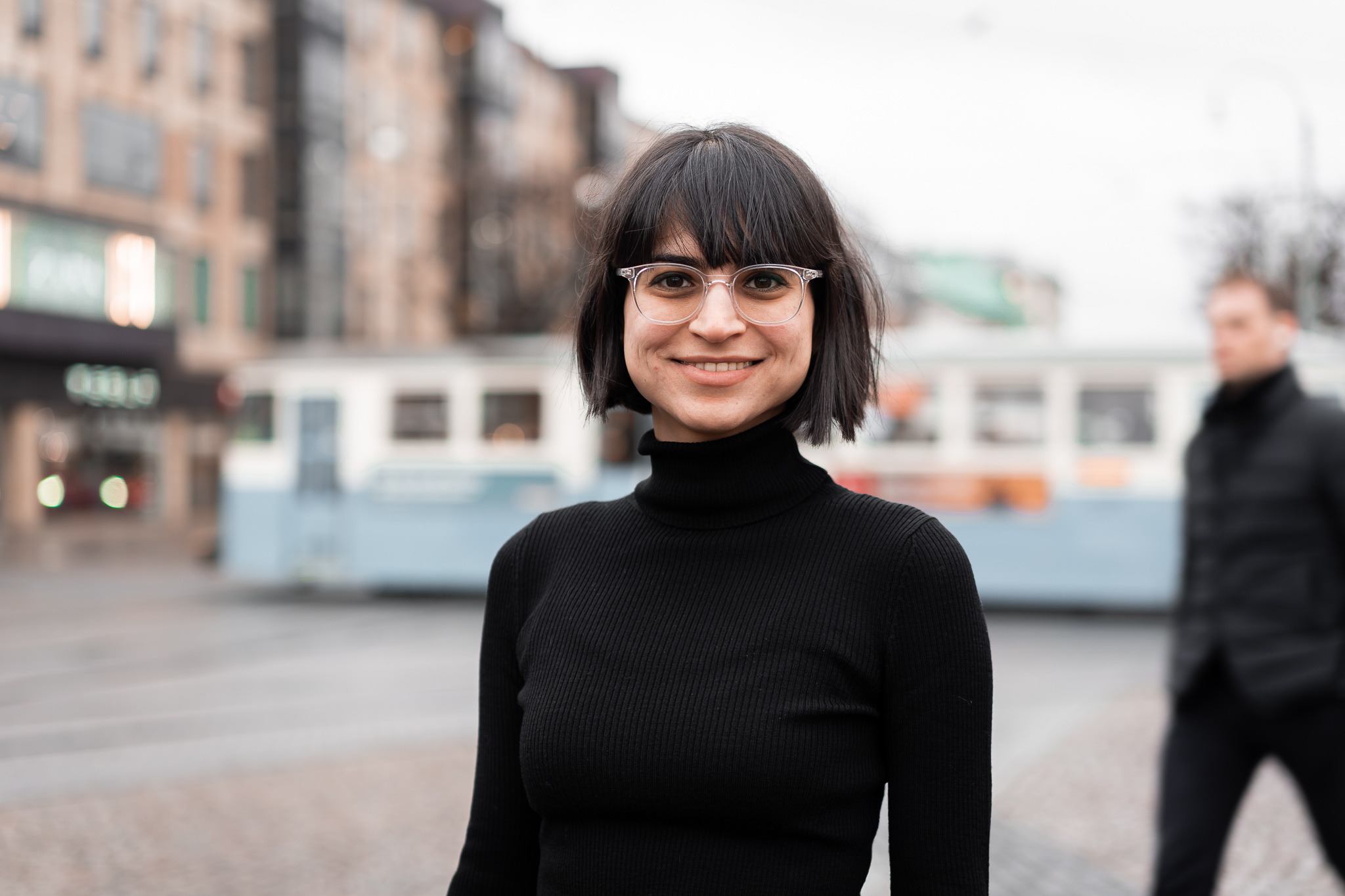Hello and welcome to another Vinnter staff spotlight, where this time it’s the turn of Dilan Ustunyagiz who has some fascinating perspectives when it comes to cultural differences between countries, life as a professional woman in 2021, and much more besides.

What was life like growing up in Istanbul and how does the town where you were raised compare to where you live now?
Living in Istanbul, in such a big city with a 15.5 million population has both its pros and cons. I like the options big cities offer. Yet, having a busy working schedule, 24/7 traffic and lack of accessibility, and lack of breathable places accelerates your stress level after a while.
Moving to Gothenburg for my master’s education, the first thing I said to myself when I landed in was, “I can breathe here.” I love how green* Gothenburg is. Although, it’s significantly smaller than Istanbul, I found Gothenburg more people oriented. It feels like the cities are built for people in Sweden. It’s a relatively small city for me, yet I find it cozy, walkable and, most importantly, safe here. There might not be as many options as big cities offer here, yet it’s accessible.
* Gothenburg is indeed a super-green destination. As Sweden’s second largest city, the metropolis has a global reputation for pushing environmentally friendly and sustainable solutions.
Such is Gothenburg’s devotion to green technology and developments that in 2020 it was named the world’s most sustainable destination for the third year running.
Can you tell me a little about your time in Istanbul with Accenture and how this compares to working in Sweden.
Turkey is a highly hierarchical country* which is reflected in its work culture as well. Titles matter a lot. You cannot easily reach out to even your own company’s CEO. Especially as a junior professional, you have no right to question or choose what you want to do. I am a curious person, and I cannot be motivated without knowing ‘the why’.
Sweden has a very flat structure. Knowing that I am listened to, no matter where on the corporate ladder I am, is empowering. Swedish culture of valuing people creates a very human work environment.
There’s a culture of work-life balance, there’s less ego and more of a focus on common goals, which just eases the work.
When it comes to leadership style, although it depends a lot on company culture and individuals, I believe all the above headlines contribute to having a more trust-based leadership as general practice in Sweden. Seeing I am listened to and heard, trusted, and valued in Sweden motivates me to go that extra mile.
* Almost all decision making in Turkish businesses is centralized to a few high-level executives. It’s not unusual to have to wait for an answer for a protracted period of time while a decision maker is tracked down to give their seal of approval.
Why did you move to Sweden?
Turkey is a patriarchal country. It is way behind Sweden when it comes to gender equality*. Women are not physically safe whenever, wherever and that’s only the tip of the iceberg. Discrimination, and verbal abuse are a daily practice towards women, and the lack of value given to women affects you, kills your confidence, and your faith in yourself.
Another point is economic instability. Even if you have a good degree and a well-paid job it’s hard to save, travel, or build for your future.

When it comes to professional concerns, work culture in Turkey was exploitative rather than empowering. I remember telling myself, “This can’t be my life,” after finally getting home at 11pm from work, hardly even finding the energy and time to take a shower, since I needed to wake up at 6am in the morning and go back to a job where I am not appreciated and valued.
* Sweden tops the European Institute for Gender Equality Gender Equality Index 2020, with a gap between it and second place Denmark of 6.4% – the biggest gap between any two consecutive ranks on the whole index.
The World Economic Forum Global Gender Gap Index ranks 156 countires and is built on a framework of women’s economic participation and opportunity, educational attainment, health and survival, and political empowerment. In the latest report, Sweden sits at number five while Turkey languishes way down at 133.
Turkey recently caused international concern by announcing its withdrawal from the Council of Europe Convention on Preventing and Combating Violence against Women and Domestic Violence (Otherwise known as the Istanbul Convention).
What made you stay in Sweden and what made you choose Vinnter as your employer.
What I like the most about Sweden is the human focus, both in social and professional settings. Everything is designed for people and serves people, which shows the value Sweden gives to people. Although no place on earth is fully equal, Sweden values what I have to say as a non-Swedish junior woman in business. Being listened to, heard, and valued in Sweden has been empowering me and I feel this country is helping me reaching my full potential.
Yet, finding a permanent job was honestly wearying. Although myself and all my network believes in my capabilities, there’s still much subtle discrimination and bias towards non-Europeans. Sweden has come a long way when it comes to gender, yet when it comes to racial equality* there’s still far to go in my experience.
I have been looking for a permanent contract for the last three years and last year I applied for approximately 900 jobs. I eventually managed to get couple of offers and I believe this is where Vinnter showed its difference. I loved how human they were in the recruitment process. They were not looking for a particular resume but a particular person. How a company interviews candidates tells a lot about the company and its culture.
Now that I have been working at Vinnter for a couple of months, I see that it was definitely the right choice and worth all the job-seeking stress.
* According to the Organization for Economic Cooperation and Development, Sweden has the most segregated labor market for people of a foreign background, regardless of education level, in the whole of Europe. Research by the European Network Against Racism has shown that skin color and ethnic/religious background has a significant impact on labor market opportunities in the country.
Why did you choose IT and leadership as your choice of work?
Historically, good leadership and workplace success are defined by masculine qualities such as competitiveness, assertiveness, and risk-taking. Yet, I see that the world is moving towards more feminine qualities when it comes to leadership such as flexibility, effective speaking skills, care for team members, attention to detail, patience, and intuition.
To me leadership is about understanding people, both your customers and employees, which you cannot accomplish without a human centric focus.
From my unappreciated human-centric approach towards leadership, which often is found to be weak, to my experiences with both control-based and trust-based work environments, I had been drawn to read and learn more about leadership.
Can you share a little about your experience as a young female professional in a very male dominated arena?

I wrote one of my master theses in “Decreasing percentage of women throughout the career ladder”. What I realized after interviewing 15+ senior women in business was that things don’t get easier throughout the career journey. To me, as a female, a foreigner, and a young professional working in male dominated area, people questioning my capabilities has always been a thing. However, I do not think I have experienced most of the reality, yet.
Historically masculine definitions of workplace success might not be in women’s favor. However, if we talk about today, I am happy about where I am. Although there are significantly fewer women in the company, both on the consultancy and client side, I see that I am respected, listened to, heard, and valued. I feel like I belong to the team.
Deconstructing historically masculine workplace definitions takes time and requires people with the right mindset. I see that people I am working with are in the same mindset as me and to me that’s what matters the most.
Final Thoughts
We hope you enjoyed this spotlight interview on Dilan Ustunyagiz. It’s always interesting and valuable to garner the insights of people from different cultures and backgrounds as they often reveal issues or perspectives that we, as natives to the country, are unaware of or simply take for granted.
Any sensible businessperson knows that having people from a range of backgrounds only serves to diversify the ideas and creativity you have available to you. And there’s no such thing as having too many ideas.
Thank you Dilan for taking the time to speak with us, and we sincerely hope you continue to find your time with Vinnter as rewarding and fulfilling as you have so far.





